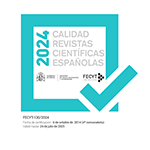The invocation of the forefathers in Cicero’s "De diuinatione" and "De natura deorum". Religio and Roman identity in the end of the republic
Abstract
The invocation of the ideal of mos maiorum, understood as a set of virtues or exemplar characteristics of the Romans, has been repeatedly examined in Cicero’s texts. Andrew Wallace-Hadrill analyses the topic in relation to the discussion regarding Roman identity in first century B. C. texts and he demarcates three different ways of using it: one which he defines as typically aristocratic, that refers to one particular individual’s noble ancestors; a second use which, instead of singularising, amalgamates all forefathers in a same group and establishes a continuity between past and present; finally, a third way which postulates an absolute gap between the world of the forefathers and the one of the contemporaries. In this paper we will examine how this topic works in Cicero’s De divinatione and De natura deorum. From our viewpoint, the ideal of mos maiorum involves not only ethical and moral virtues, but also represents a special attitude towards gods and worship, which is central in the definition of Roman identity.Downloads
Article download
License
In order to support the global exchange of knowledge, the journal Cuadernos de Filología Clásica. Estudios latinos is allowing unrestricted access to its content as from its publication in this electronic edition, and as such it is an open-access journal. The originals published in this journal are the property of the Complutense University of Madrid and any reproduction thereof in full or in part must cite the source. All content is distributed under a Creative Commons Attribution 4.0 use and distribution licence (CC BY 4.0). This circumstance must be expressly stated in these terms where necessary. You can view the summary and the complete legal text of the licence.








